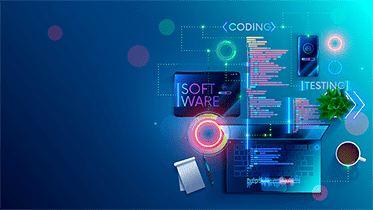The Importance of Application Development Services in the Digital Age
In today's fast-paced digital landscape, businesses must leverage application development services to stay competitive. Custom applications streamline processes, enhance user engagement, and improve overall efficiency. From small startups to large enterprises, the need for high-performing applications has never been greater.
Why Is Application Development Important?
Organizations across industries recognize that application development is essential for business success. Custom applications provide tailored solutions to meet unique operational needs. why is application development important, improve internal workflows, and increase automation capabilities. With workforce automation becoming a priority, applications help businesses reduce manual work, increase productivity, and optimize resource allocation.
Modern applications also provide seamless integration with various digital tools and technologies. Whether through cloud-based solutions, IoT devices, or artificial intelligence, applications enhance operational efficiency and ensure businesses remain agile in an evolving digital economy. Additionally, security and scalability are crucial factors in application development, allowing businesses to protect sensitive data while accommodating growth.
The demand for efficient software solutions has led to the rise of generative AI app development. AI-powered applications enhance decision-making, provide predictive analytics, and automate repetitive tasks. This revolution in application development helps businesses scale efficiently while maintaining cost-effectiveness. AI-driven apps can personalize user experiences by analyzing user behaviors and adapting functionalities accordingly, creating a more engaging and interactive digital experience.
Native vs. Hybrid App Development: Choosing the Right Approach
When investing in application development services, businesses must choose between native vs. hybrid app development. Each approach has distinct advantages and limitations, depending on business needs and objectives.
Native App Development
Native apps are built for a specific platform, such as iOS or Android, using platform-specific programming languages like Swift or Kotlin. They offer superior performance, seamless integration with device features, and enhanced security. These applications provide a more refined user experience, as they take full advantage of platform-specific functionalities. However, native app development requires separate coding efforts for different platforms, leading to higher costs and longer development timelines.
Hybrid App Development
Hybrid apps utilize a single codebase to run on multiple platforms. They are developed using web technologies like HTML, CSS, and JavaScript, combined with frameworks like React Native, Flutter, or Ionic. This approach significantly reduces development time and cost, making it ideal for businesses seeking faster market entry. However, hybrid apps may have limitations in terms of performance and access to native device features. They might not always deliver the same smooth and responsive user experience as native applications.
Choosing between native vs. hybrid app development depends on factors such as budget, target audience, functionality requirements, and long-term business goals. While native apps provide better performance and customization, hybrid apps offer a more cost-effective and flexible solution.
Workforce Automation Through Application Development
Workforce automation is transforming industries by eliminating repetitive tasks and improving operational efficiency. Custom applications integrate automation tools to streamline business processes, reduce human errors, and enhance collaboration.
Automated workflows allow businesses to manage tasks more efficiently, ensuring that resources are allocated effectively. Features such as AI-driven chatbots, automated reporting systems, and machine learning-powered decision-making tools improve productivity and customer engagement. Additionally, workforce automation applications help organizations manage remote teams, monitor employee performance, and track business processes in real time.
Businesses utilizing application development services for workforce automation benefit from increased efficiency and reduced operational costs. Applications powered by AI and machine learning further enhance automation capabilities, enabling predictive analytics, real-time decision-making, and improved workflow management. This transformation allows businesses to shift their focus from repetitive manual tasks to more strategic initiatives, driving innovation and long-term growth.
The Rise of Generative AI in App Development
Generative AI app development is revolutionizing how applications are built and deployed. AI-driven tools automate coding, optimize design elements, and generate application features based on user preferences. This not only speeds up the development process but also enhances creativity and innovation in app design.
AI-powered applications personalize user experiences by analyzing behavioral data and making intelligent recommendations. For example, AI-driven e-commerce applications can suggest products based on customer browsing history, while AI-powered healthcare apps can provide personalized treatment plans based on patient data. Businesses investing in generative AI app development gain a competitive advantage by leveraging automation, personalization, and advanced analytics.
Furthermore, AI in application development enhances cybersecurity by identifying potential vulnerabilities and automatically suggesting security enhancements. AI-driven testing tools also streamline the quality assurance process, ensuring applications are more robust and free from errors before deployment.
Future Trends in Application Development
The field of application development services continues to evolve, driven by emerging technologies and changing consumer expectations. Some key trends shaping the future of application development include:
5G Integration: The adoption of 5G technology enables faster and more efficient mobile applications, enhancing user experiences and supporting advanced functionalities like AR/VR.
Blockchain Technology: Secure, decentralized applications are becoming increasingly popular in finance, healthcare, and supply chain industries.
IoT-Enabled Applications: The Internet of Things (IoT) is driving the development of applications that integrate smart devices for enhanced automation and data exchange.
Progressive Web Apps (PWAs): These applications combine the best features of web and mobile apps, providing seamless performance across different devices.
By staying ahead of these trends, businesses can leverage application development services to create innovative solutions that meet evolving market demands.
Conclusion
Investing in application development services is crucial for businesses aiming to stay ahead in the digital world. Understanding the difference between native vs hybrid app development helps companies choose the right technology stack for their needs. By integrating workforce automation, organizations enhance efficiency, reduce costs, and improve operational effectiveness. The rise of generative AI app development further transforms the industry, enabling businesses to build intelligent, scalable applications that drive success.
By prioritizing application development, businesses create innovative solutions that enhance user experiences, optimize processes, and drive growth in an increasingly competitive market. As technology continues to advance, businesses that embrace these trends will remain ahead of the curve, ensuring long-term success in a rapidly evolving digital ecosystem.


Comments
Post a Comment